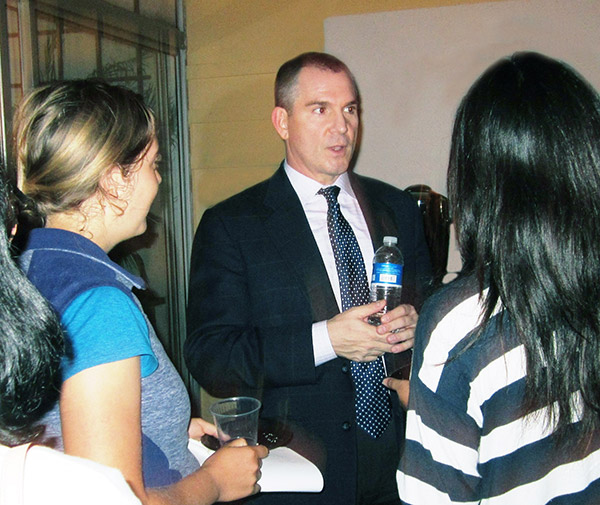By:
- John B.B. Freeman
Published Date
By:
- John B.B. Freeman
Share This:
New York Times Columnist Frank Bruni Warns Audience to Avoid ‘Customized Cocoons’ of Technology
Lecture kicks off 2014-15 Helen Edison Lecture Series

Bruni meets with UC San Diego students after his presentation. Photo by John Freeman
What fuels Frank Bruni’s unflinching curiosity—and often, his New York Times opinion column—frequently comes down to his penchant for seeking out the strange over the familiar.
In a 45-minute presentation Oct. 29 at UC San Diego’s Mandeville Auditorium, Bruni delivered a well-crafted case for why he’s become wary of the all-too-convenient tools of personal technology.
His message: Avoid becoming encased in what he termed “these customized cocoons.”
“What this age has wrought is … instead of taking advantage of the limitless options that are now available, some of us don’t go broad, we go narrow and narrower still,” he said. “[We] become increasingly invested in one way of thinking, increasingly addicted to one type of diversion and increasingly immersed in one type of experience.”
Nearly 400 people attended the event, co-presented by UC San Diego Extension with the UC San Diego Council of Provosts and the Dean’s Office of Social Sciences. It was the inaugural edition of the 2014-15 Helen Edison Lecture Series, part of Extension’s programs of public outreach made possible by private support.
While on a recent sojourn to China, Bruni had spent his first few days with “the same books, magazines and videos” he brought with him. To his intellectual dismay, he was “choosing the comfort of the utterly familiar over the challenge and enlightenment of the strange. ... I was shrinking my world instead of expanding it.”
Why is such stratified behavior to be shunned? “It’s important not only in terms of politics and public discourse,” he said, “but in terms of personal fulfillment, in terms of real contentment.”
To wit: “I bet if you all look hard and honestly at your own lives, you’ll see that the greatest satisfactions and joys came because you pushed yourselves outside of your comfort zones. I know that’s been the case for me.”
To further his point, Bruni drew laughs citing a New Yorker magazine cartoon that portrayed a sophisticated traveler raving to her equally worldy companion: “We loved Tuscany! The cell reception was fantastic!”
“We’re so connected that we’re dis-connected,” said Bruni. “We don’t jettison the usual suspects to make room for some unusual things. We don’t cut the cord. But it’s not just about the cell reception or the Wi-Fi. It’s about what we do with the cell reception and the Wi-Fi and touchscreens.”
“Many of us take (only) the genre we like best,” he added. “We marinate in it, we wallow in it —so that we taste the same flavor over and over again.”
Moving deftly from foodie to politico to media junkie, Bruni said he still gets more questions about being the Times’ restaurant critic than any other roles he’s had—including White House correspondent, Rome-based essayist, and best-selling author.
“Even though it seems frivolous to some, (being a food critic) is taken very seriously by our readers, especially in New York City,” said Bruni. Five years in that role, dining out up to seven nights a week under literary pseudonyms like “M. Twain” to avoid detection, was not enough to fend off gout, but enough to eventually become “redundant.”
The next installment of the Edison Lecture Series will present acclaimed author/historian Kevin Starr, Dec. 2, at 7 p.m. in UC San Diego’s Price Center East Ballroom.
Share This:
Stay in the Know
Keep up with all the latest from UC San Diego. Subscribe to the newsletter today.



